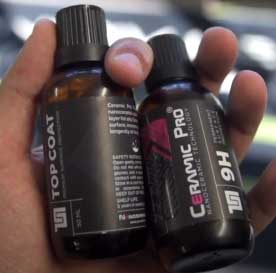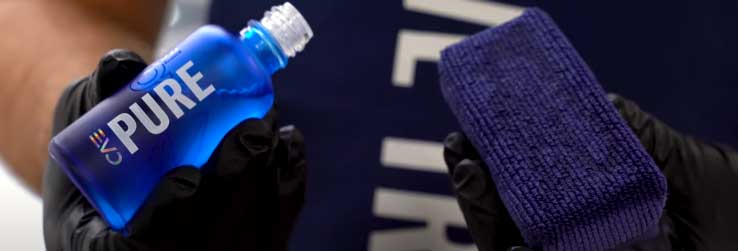When it comes to vehicle protection, Ceramic Pro and Gyeon ceramic coatings are two of the industry’s big hitters. They are at the forefront of the innovation wave, leveraging cutting-edge technology to provide unrivaled protection for your vehicle.
This article will delve deep into their respective offerings, comparing and contrasting the two, providing you with the information you need to make an informed decision.
A Brief Comparison Table
| Key Aspects | Ceramic Pro 9H | Gyeon Quartz |
| Composition | High-density ceramic | Pure Silicon dioxide |
| Hardness | 9H | Varies based on product |
| Application | Professional recommended | DIY-friendly |
| Environmental Considerations | Indirectly eco-friendly | Explicitly eco-friendly |
| Range of Products | Limited | Extensive |
| Lifespan | 2-5 years (with maintenance) | 1-3 years |
| Cost | High | Varies, generally more affordable |
The Powerful Presence of Ceramic Pro

Ceramic Pro has been a leading light in the vehicle coating market.
Their flagship product, the Ceramic Pro 9H, is acclaimed for its resilient durability.
The ‘9H’ denotes its hardness on the pencil hardness scale, a globally recognized measurement.
It’s pretty much like a transparent shell for your car, and its high gloss finish certainly adds to your vehicle’s visual appeal.
Ceramic Pro’s advantages lie in its incredible hydrophobic properties, resistance to chemical damage, and thermal stability. It acts as a repellent to water and other substances that could otherwise stain your vehicle.
Its thermal stability means it can handle the high temperatures encountered on a hot day or intense driving sessions without losing its protective capabilities.
However, it’s crucial to remember that Ceramic Pro’s durability heavily depends on the application process. It requires professional installation to ensure the 9H ceramic coating bonds correctly with your vehicle’s surface. This process can be time-consuming and costly.
Moreover, the 9H coating is usually layered multiple times for optimal results, adding to the expenses.
Also Read: Differences Between ResistAll And Ceramic Coatings.
Gyeon’s Ceramic Coating: Strength in Versatility

Gyeon, on the other hand, is a brand known for its wide range of ceramic coatings that cater to different needs and budgets. This variety gives Gyeon an edge, especially for users who want to try out ceramic coatings without a hefty investment.
One of Gyeon’s stand-out offerings is the Gyeon Quartz, boasting similar hardness to Ceramic Pro’s 9H. What’s more, Gyeon Quartz contains pure silicon (Si) dioxide in its composition, enhancing its protection against water, dirt, and UV rays.
A significant benefit of Gyeon coatings is their user-friendly application. Gyeon’s kits often come with all the necessary tools for a DIY coating, which can save on professional installation costs.
Additionally, Gyeon places a strong emphasis on environmental sustainability. The company’s products are eco-friendly, which is a significant selling point for environmentally conscious consumers.
However, Gyeon coatings may not last as long as Ceramic Pro’s. While this can be seen as a drawback, Gyeon’s ease of reapplication may make up for it.
Key Differences Between Ceramic Pro and Gyeon Ceramic Coating
While both Ceramic Pro and Gyeon ceramic coatings offer a range of benefits, it’s essential to delve deeper into their key differences to make an informed decision.
Each brand has unique strengths and nuances that set it apart, and understanding these contrasts can significantly influence your choice.
- Composition and Hardness
When it comes to composition, Ceramic Pro’s 9H product impresses with its high-density structure. The coating has been engineered to deliver an ultra-hard layer that is resistant to scratches, UV rays, and environmental contaminants.
In comparison, Gyeon uses pure silicon dioxide in its Quartz product, offering a different kind of protection. While it also provides scratch resistance and UV protection, the focus here is more on the hydrophobic effect and self-cleaning capabilities.
- Application Process
The application process can significantly impact the user experience and the overall cost. Ceramic Pro’s coating application is more complex and typically requires professional installation.
It is not just about layering the product; the car’s surface needs extensive prep work. As a result, the application process can be time-consuming, and the total cost can add up quickly.
Gyeon, on the other hand, offers a more user-friendly approach. Many of their ceramic coating kits come with everything needed for a DIY application, making it more accessible and affordable for the average car owner.
- Environmental Considerations
In today’s world, many consumers are becoming increasingly environmentally conscious, and Gyeon has responded to this trend. They have made a conscious effort to ensure their products are eco-friendly, reducing their carbon footprint and aligning with modern sustainability values.
Ceramic Pro, while not explicitly highlighting their eco-friendly attributes, still provides a kind of environmental protection. By offering long-lasting coatings, they reduce the frequency of reapplications, indirectly leading to less product consumption and waste over time.
- Range of Products
Gyeon has a more extensive range of products compared to Ceramic Pro. Gyeon offers various levels of protection, allowing you to choose what suits your budget and needs best.
Ceramic Pro, on the other hand, focuses more on providing a premium, high-durability solution.
Also Read: Comparison of Ceramic And JetSeal Coatings.
Frequently Asked Questions (FAQ)
Deciding the “best” company depends on your specific needs. If you’re after long-lasting protection and a glossier finish, Ceramic Pro may be a better choice. If you want versatility, eco-friendliness, and a more affordable range, Gyeon could be the better option.
Ceramic Pro Strong is a different product from the Ceramic Pro 9H. It’s primarily designed for marine use or industrial surfaces, providing high-density protection. For most automotive applications, 9H is typically more suitable due to its balance of hardness and flexibility.
Gyeon’s durability can vary depending on the specific product, how it’s applied, and the vehicle’s use and maintenance. Typically, Gyeon coatings can last between 12 to 36 months, but periodic maintenance will help prolong the lifespan.
The best ceramic surface prep generally involves thorough cleaning and decontaminating the vehicle, followed by clay barring to remove any embedded contaminants. This is followed by polishing to remove swirls and scratches, then a final IPA wipe down to ensure a clean surface for the ceramic coating to bond.
The Final Takeaway
In the Ceramic Pro and Gyeon ceramic coatings showdown, the winner will depend on your specific needs, budget, and priorities. Both brands provide high-quality ceramic coatings that offer superior protection for your vehicle.
But the right choice ultimately boils down to what’s important for you: long-lasting gloss and hardness, or variety, ease of application, and environmental sustainability. Do your due diligence, consider your needs, and choose wisely.
After all, it’s about giving your vehicle the protection it deserves.

